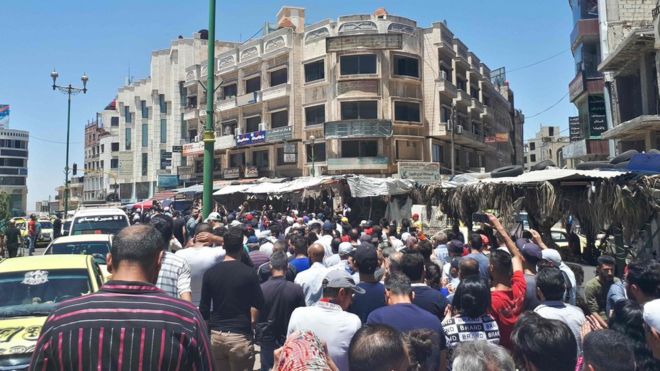Syria is in the grips of a deepening economic crisis, fuelled by US and European sanctions, plus neighboring Lebanon’s dramatic financial decline and associated currency crash.
The Syrian pound followed its Lebanese counterpart this week and crashed spectacularly, sending the cost of living through the roof and sparking fears amongst ordinary Syrians of an impending famine.
Syrian Pound in trouble
The Syrian pound traded at 47 pounds to the dollar prior to the country’s bloody civil war, but has now hit 3,000 pounds to the dollar. The currency had been on an even-paced decline until last week. From Saturday to Monday the parallel exchange rate skyrocketed from 2,300 to 3,000 pounds to the dollar where it was still hovering on Wednesday.
The head of Lebanon’s money-changing syndicate, Mahmoud Murad, said the plunging Syrian and Lebanese currencies are “surprising and incomprehensible,” but the two economies are intrinsically linked. “They are twins,” he explained to Arab News on June 11.
“What affects the Lebanese pound affects the Syrian pound, and vice versa. The dollar exchange rate in Syria suddenly jumped to 3,500 pounds before unexpectedly dropping to between 2,600 and 2,700 pounds.
“We do not know why. Has someone poured US dollars into the Syrian market to cause this drop? Where did these dollars come from? It is strange,” Murad said.
As of this week, the Syrian pound has lost 80% of its value in the last 12 months alone. The worrying trend is concerning all levels of society, pushing some Syrians back to the streets for the first time since the 2011 Arab Spring protests that descended into civil war.
Protests entered their fourth day on Wednesday, and have spread to the majority Druze city of Suweida. Demonstrators started with economic slogans, but in Suweida, which has largely been exempt from the conflict, openly called for Al Assad’s downfall.
“Protesters called for freedom and toppling of the regime as a result of popular anger over the deteriorating economic, social, security and political situation,” Syrian activist Noura al Basha told Reuters on Thursday.
Soaring Cost of Living
The sudden currency crash has sent the price of basics like bread through the roof, pushing more Syrians into poverty and hunger.
“Prices are through the roof. Every day… it’s more expensive than the day before,” Damascus mother of five Lamees al-Sheikh told the French Press Agency (AFP).
“I’m scared one day I’ll… come back home empty handed.”
Business owners are also worried by the fast-developing situation, and say that even after raising prices, they cannot make money.
“There is one exchange rate in the morning, and another one in the afternoon,” said grocery store owner Rashed Umari from Qamishli in the north. “Everything we sell is at a loss.”
Meanwhile, Al Assad replaced Syrian Prime Minister Imad Khamis Thursday, according to state media. Al Assad is yet to provide an explanation for Khamis’ downfall, but the move indicates the growing civil unrest and economic problems are also being felt in the upper echelons of Syrian politics. Given the interlinked nature of the Syrian and Lebanese economies and ongoing sanction pressure, it is unclear how Al Assad can reboot Syria’s ailing economy and how the war-weary Syrians will respond to the unfolding situation.
Read also: Despairing Domestic Workers Dumped at Ethiopian Consulate in Lebanon

